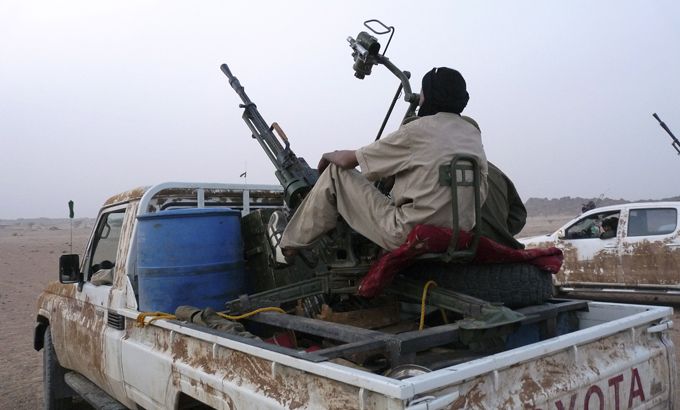Tuareg rebels ready for Mali talks
City of Timbuktu falls to rebels in the north, as pressure mounts on leader of last week’s coup to hand over power.

Tuareg rebels in Mali’s north have expressed a willingness to negotiate with the government or regional bloc ECOWAS after having seized the ancient city of Timbuktu.
The rebel offensive came amid the chaos gripping the West African country following last week’s military coup.
The National Movement for the Liberation of Azawad (MNLA) said they were no longer seeking to expand their area of control, having secured the borders of what the group considers to be a Tuareg homeland.
“Our objective it not to go further than the Azawad borders. We don’t want to create problems for the government of Mali, and even less create problems in the sub-region,” said Hama Ag Mahmoud, of the MNLA’s political wing.
“We don’t want to give anyone the impression that we’re gung-ho for the war, so from the moment we have liberated our territories, our objective is achieved, we stop there.”
He said that while his group had not yet been contacted regarding talks, they were open to them.
“We are open to all attempts … [to] all means of negotiations through ECOWAS [Economic Community of West African States], through another organ or through big powers, we are effectively open, but for now we haven’t received any attempt of negotiation,” he said.
Timbuktu seized
Earlier, the rebels overran Timbuktu, a long-time target of their movement.
“[Tuareg rebels] have arrived in the town. They are planting their flag,” El Hadj Baba Haidara, a member of parliament for Timbuktu, told the Reuters news agency on Sunday.
A resident told Reuters that the rebels had hoisted the Tuareg flag at the governor’s office, the mayor’s office and the main military camp.
The capture of Timbuktu came hours after the rebels took the garrison town of Gao, following a withdrawal by Malian army forces.
Al Jazeera’s Hashem Ahelbarra, reporting from Mali capital, Bamako, said that by capturing Timbuktu, the rebels had “managed to do what had eluded them for decades”.
He said that when mutinous soldiers overthrew the government, they said it was with the intention of establishing a genuine democracy in Mali.
“However, what they failed to take into account was that the army was sort of disintegrating and that the rebellion was going to take advantage of that situation to claim more than one third of the country,” he added.
Fighting under the banner of the MNLA, the rebels re-launched their decades-long military campaign for a separate homeland in mid-January and have since seized Kidal, another key town in the north.
The setbacks at the hands of the heavily armed rebels piled pressure on Mali’s coup leaders who had been given until Monday to start handing back power or face sanctions by the ECOWAS regional bloc.
Constitution ‘reinstated’
Threatened with crippling sanctions, coup leader Captain Amadou Sanogo agreed to reinstate the constitution and hold elections, hours before the 72-hour deadline set by ECOWAS expired.
|
Al Jazeera’s Hashem Ahelbarra reports from Bamako |
Sanogo, who dissolved the nation’s constitution after grabbing power in a military takeover, said on Sunday that the 1992 law had been “reinstated”.
He told journalists in Bamako that the military rulers had “decided to engage, under the guidance of a mediator, in consultations with all the forces active in our country in the framework of a national convention”.
These talks should lead to the creation of transitional organs “to organise free, open and democratic elections in which we will not participate,” said Sanogo.
He did not specify the duration of the transition.
After that concession by the junta, neighbouring countries agreed to mediate between the rebels and the military rulers.
Economic sanctions
Kadre Desire Ouedraogo, President of ECOWAS, told Al Jazeera the grouping was satisfied with Sanogo’s intentions.
“This is what ECOWAS demands, that the constitutional order be re-established,” Ouedraogo said.
“And if the junta is now accepting this plan we do not see any other difficulty, we are ready to accompany them to restore normality and then we will see how to deal with the situation in the north.
“We want a peaceful solution. That’s why ECOWAS has called for a ceasefire and we offer negotiations with the rebels. But in case they don’t accept the offer of negotiations, then ECOWAS will use any other means to protect the territorial integrity of Mali.”
In addition to a threat to close borders to a country largely dependant on fuel imports, ECOWAS had vowed to starve Mali of funds from the central bank of the regional monetary union, and impose asset freezes and travel bans on individual coup leaders.
Mid-ranking officers, led by Sanogo, toppled Malian President Amadou Toumani Toure on March 21 in protest at not having adequate weaponry to rein in the Tuareg rebels.
While coup leaders won some support from many Malians fed up with Toure’s rule, the latest military defeats and the sheer scale of foreign disapproval have weakened their position.